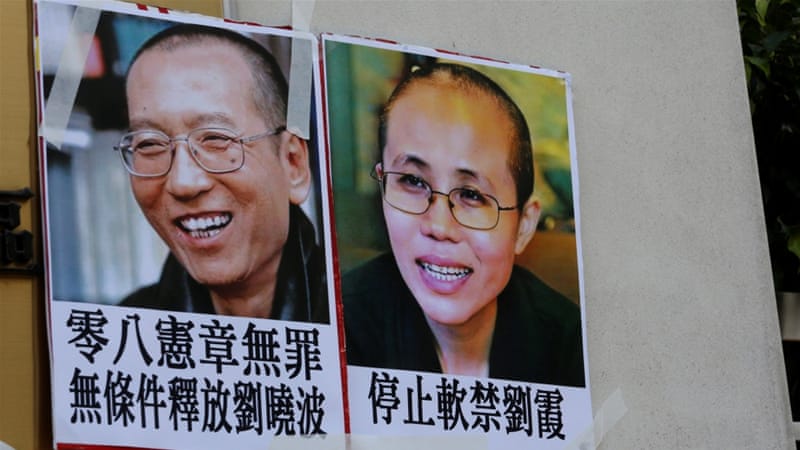http://www.aljazeera.com
 Prison officials said Liu is being treated at a hospital in Shenyang city.
Prison officials said Liu is being treated at a hospital in Shenyang city.A growing chorus of Chinese human-rights lawyers and activists are calling for Nobel Peace Prize-winning activist Liu Xiaobo's unconditional release after he was granted medical parole to undergo treatment for late-stage liver cancer.
The US also added its voice on Tuesday urging China to give Liu and his wife, Liu Xia, freedom to move and choose his own doctors.
A brief video has emerged of Liu Xia tearfully telling a friend that no treatment -- surgery, radiation or chemotherapy -- would work for her husband at this point.
"[They] cannot perform surgery, cannot perform radiotherapy, cannot perform chemotherapy," Liu Xia, who has been under effective house arrest since 2010, says in the video.
The news has shocked and angered supporters and human-rights campaigners, who questioned if the democracy advocate had received adequate care or whether the Chinese government had deliberately allowed him to wither in prison.
Liu was jailed for 11 years in 2009 for "inciting subversion of state power" after he helped write a petition known as "Charter 08" calling for sweeping political reforms.
China has criticised calls for Liu's release as "irresponsible" and interference in its internal affairs.
Hundreds of Chinese lawyers, activists and friends have signed a petition calling on authorities to give Liu "complete freedom" and allow his wife to "have contact with the outside world".
They also called on authorities to carry out a "thorough investigation" into the circumstances that led to the deterioration of his health.
'Deliberately sentenced'
Prison officials said Liu is being treated by "eight renowned Chinese oncologists" at a hospital in the northeastern city of Shenyang.
Friends of the couple told AFP news agency that Liu Xia has been allowed to visit him there.
Wu'er Kaixi and Wang Dan, former student leaders at the 1989 Tiananmen democracy protests who now live overseas, posted a joint statement on Twitter saying China had "deliberately sentenced him to death".
In Hong Kong, about 70 supporters of Liu took to the streets to demand his immediate release on Tuesday, chanting slogans denouncing the Chinese government as a "murderer".

Dozens protested in Hong Kong on Tuesday over Liu's treatment in prison.
Human rights campaigners also demanded to know whether Liu received any medical treatment while he was in jail and why he was not given parole earlier.
"It's very difficult to understand why his illness is only being treated at the last stage," said Amnesty International's Patrick Poon.
Human Rights Watch's Sophie Richardson, citing two other cases of critics who died in detention, said the government "needs to be held to account for permitting yet another peaceful critic to fall gravely ill while unjustly detained".
She said China had a history of allowing "peaceful critics to become gravely ill and die in detention".
Among them are Tibetan monk Tenzin Delek Rinpoche, who was 13 years into a life sentence for terrorism and separatism when he died in prison in July 2015.
Cao Shunli, a Chinese dissident, died in custody in March 2014 after being denied medical treatment for months.
Some said Liu's treatment heightened concerns over lesser-known activists still languishing in prison.
Liu's medical parole was not a humanitarian gesture, but rather a cynical attempt by authorities to avoid a backlash for allowing such a well-known rights defender to die behind bars.
Chen Guangcheng, a human-rights lawyer who fled to the US in 2012, said: "If Liu died in prison this would arouse the anger of the people and accelerate the demise of the CCP [Chinese Communist Party]."
Wu'er Kaixi and Wang Dan, former student leaders at the 1989 Tiananmen democracy protests who now live overseas, posted a joint statement on Twitter saying China had "deliberately sentenced him to death".
In Hong Kong, about 70 supporters of Liu took to the streets to demand his immediate release on Tuesday, chanting slogans denouncing the Chinese government as a "murderer".

Dozens protested in Hong Kong on Tuesday over Liu's treatment in prison.
Human rights campaigners also demanded to know whether Liu received any medical treatment while he was in jail and why he was not given parole earlier.
"It's very difficult to understand why his illness is only being treated at the last stage," said Amnesty International's Patrick Poon.
Human Rights Watch's Sophie Richardson, citing two other cases of critics who died in detention, said the government "needs to be held to account for permitting yet another peaceful critic to fall gravely ill while unjustly detained".
She said China had a history of allowing "peaceful critics to become gravely ill and die in detention".
Among them are Tibetan monk Tenzin Delek Rinpoche, who was 13 years into a life sentence for terrorism and separatism when he died in prison in July 2015.
Cao Shunli, a Chinese dissident, died in custody in March 2014 after being denied medical treatment for months.
Some said Liu's treatment heightened concerns over lesser-known activists still languishing in prison.
Liu's medical parole was not a humanitarian gesture, but rather a cynical attempt by authorities to avoid a backlash for allowing such a well-known rights defender to die behind bars.
Chen Guangcheng, a human-rights lawyer who fled to the US in 2012, said: "If Liu died in prison this would arouse the anger of the people and accelerate the demise of the CCP [Chinese Communist Party]."
Aucun commentaire:
Enregistrer un commentaire